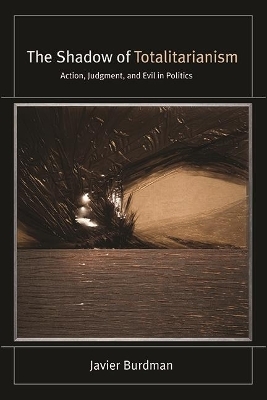
The Shadow of Totalitarianism
Action, Judgment, and Evil in Politics
Seiten
2023
State University of New York Press (Verlag)
978-1-4384-9000-7 (ISBN)
State University of New York Press (Verlag)
978-1-4384-9000-7 (ISBN)
Examines the relationship of evil, action, and judgment in the work of Immanuel Kant, Hannah Arendt, and Jean-François Lyotard.
The Shadow of Totalitarianism develops a new way to think about the problem of evil in politics. Beginning with the commonplace idea that the rise of totalitarianism in the twentieth century marked the emergence of a new form of evil, Javier Burdman finds early seeds of thinking about this form in Immanuel Kant's moral philosophy. Far from being an isolated object of inquiry, evil, Burdman argues, has long shaped and been central to philosophical understandings of political action and judgment. Systematically analyzing the relationship between evil, action, and judgment in the work of Kant, Hannah Arendt, and Jean-François Lyotard, The Shadow of Totalitarianism aligns evil in politics with a desire for moral certainty, hence the emphasis on the need to accept and affirm uncertainty in current ethical theories. The careful philosophical analysis through which Burdman develops this inquiry contributes to a better understanding of some of the theoretical complexities involved in the problem of evil and provides conceptual tools with which to approach it.
The Shadow of Totalitarianism develops a new way to think about the problem of evil in politics. Beginning with the commonplace idea that the rise of totalitarianism in the twentieth century marked the emergence of a new form of evil, Javier Burdman finds early seeds of thinking about this form in Immanuel Kant's moral philosophy. Far from being an isolated object of inquiry, evil, Burdman argues, has long shaped and been central to philosophical understandings of political action and judgment. Systematically analyzing the relationship between evil, action, and judgment in the work of Kant, Hannah Arendt, and Jean-François Lyotard, The Shadow of Totalitarianism aligns evil in politics with a desire for moral certainty, hence the emphasis on the need to accept and affirm uncertainty in current ethical theories. The careful philosophical analysis through which Burdman develops this inquiry contributes to a better understanding of some of the theoretical complexities involved in the problem of evil and provides conceptual tools with which to approach it.
Javier Burdman is Research Fellow in the School for Interdisciplinary Social Studies at the National University of San Martin in Argentina.
Acknowledgments
Introduction: Totalitarianism and the Problem of Evil in Politics
Part I: Action
1. Arendt's Reassessment of Responsibility
2. Kant on the Deceptiveness of Evil
Part II: Judgment
3. Kant on the Sublime and the Judgment of Action
4. Lyotard on Good and Evil in Postmodernity
Conclusion: Extreme Evil as a Response to Political Uncertainty
Notes
Bibliography
Index
| Erscheinungsdatum | 10.02.2023 |
|---|---|
| Reihe/Serie | SUNY series, Intersections: Philosophy and Critical Theory |
| Zusatzinfo | Total Illustrations: 0 |
| Verlagsort | Albany, NY |
| Sprache | englisch |
| Maße | 152 x 229 mm |
| Gewicht | 227 g |
| Themenwelt | Geisteswissenschaften ► Philosophie ► Ethik |
| ISBN-10 | 1-4384-9000-3 / 1438490003 |
| ISBN-13 | 978-1-4384-9000-7 / 9781438490007 |
| Zustand | Neuware |
| Haben Sie eine Frage zum Produkt? |
Mehr entdecken
aus dem Bereich
aus dem Bereich


